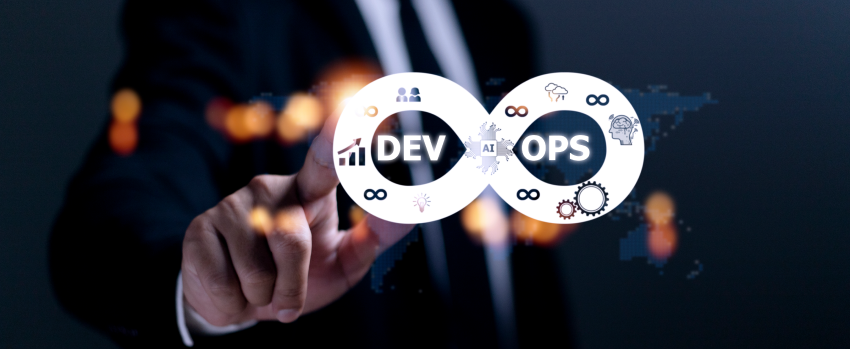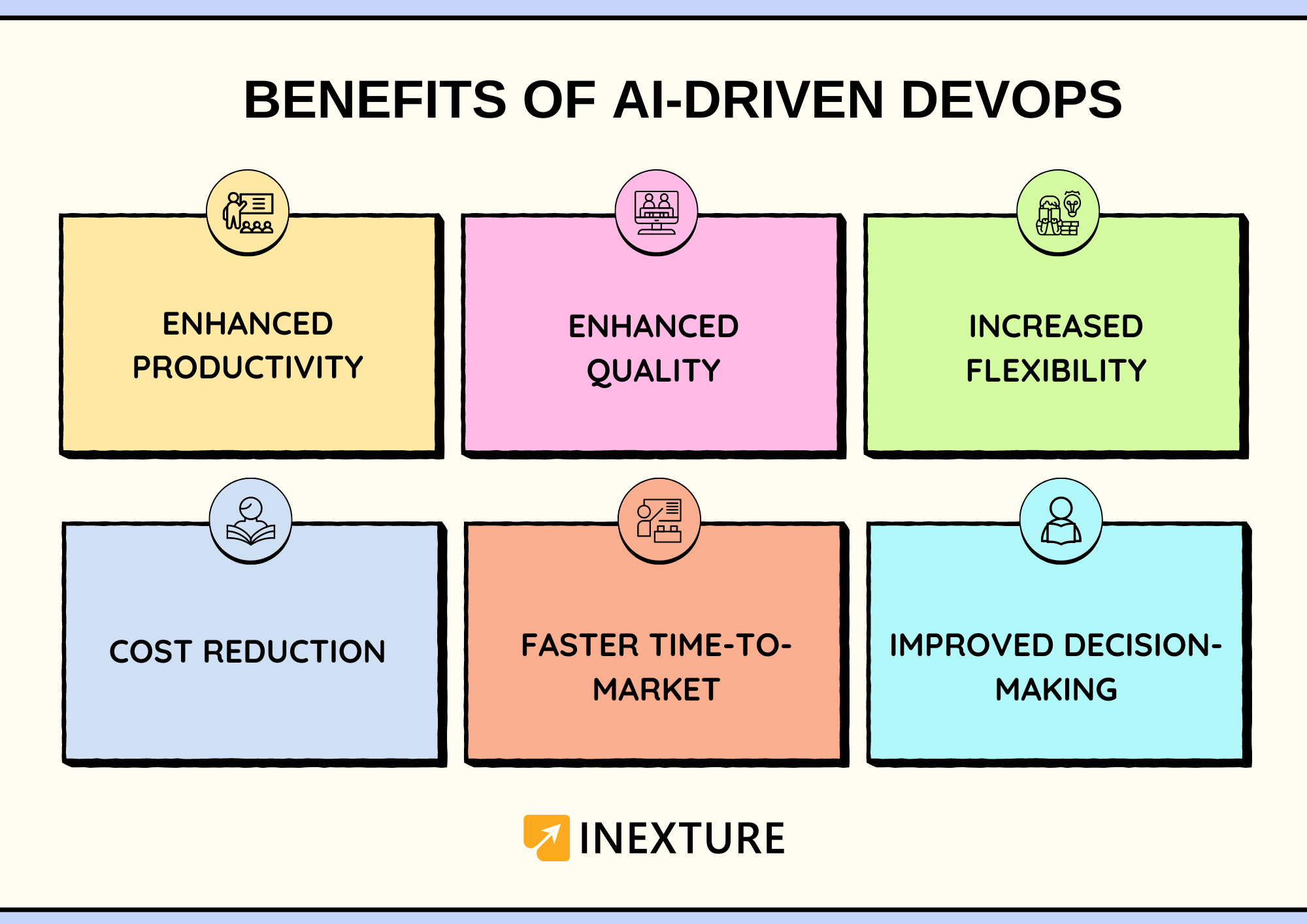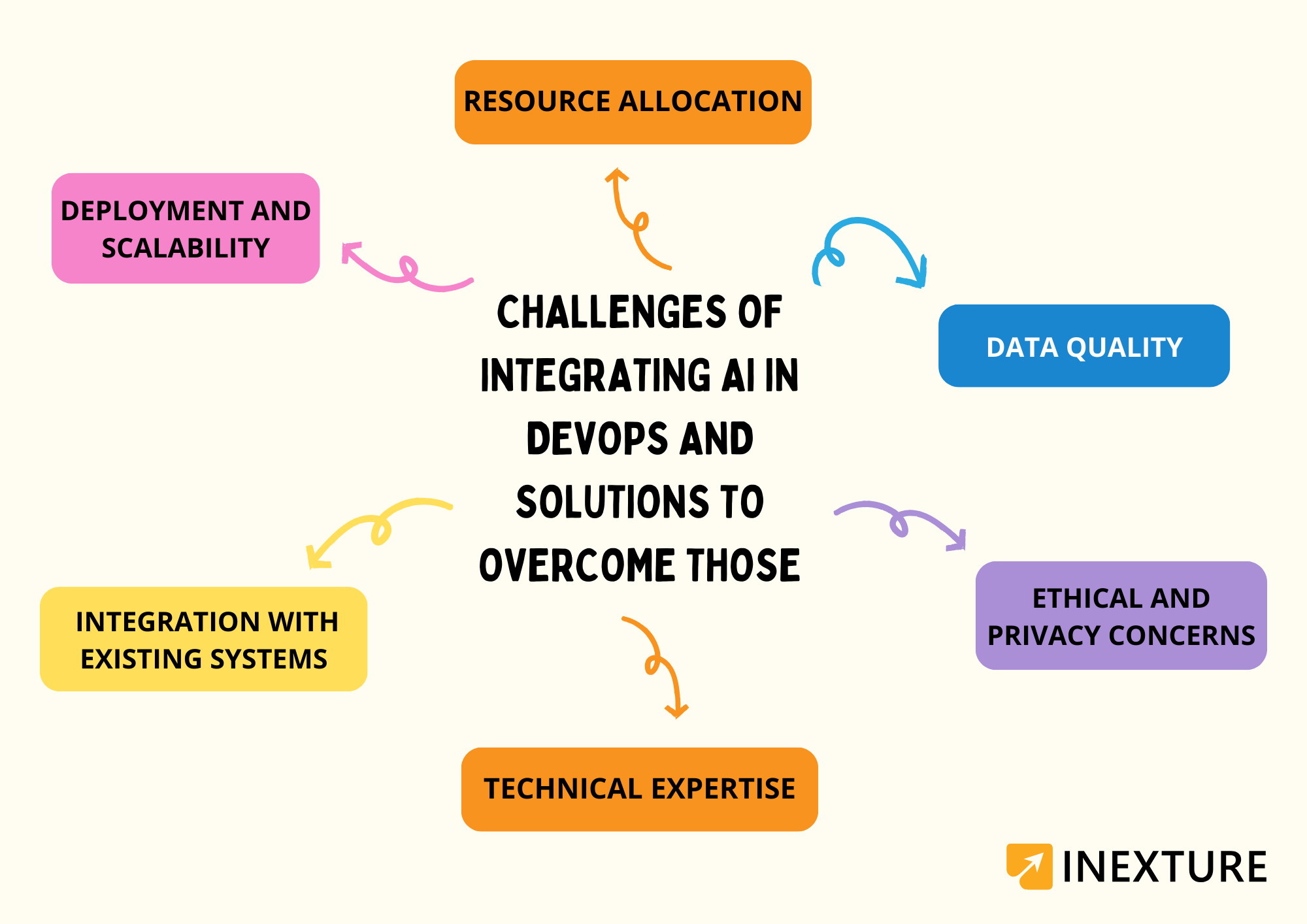Crypto Wallet App Development: Features,...
April 14, 2025

AI and DevOps integration is now creating new opportunities in software development and harnessing in the market. The different practices that constitute the so-called DevOps process are also seeing the effects of a new generation of AI-based solutions that bring new solutions that are more effective than the solutions that are already in use.
AI-driven DevOps is not just an enhancement of the existing system but indeed a new way to revolutionize the update and production cycle. It makes cooperation easier by ensuring that team members are more productive, reliable processes are in place and designed to be precise and efficient; and applied intelligence which allows outsourcing and quick problem-solving tactics that enhance the creation of higher-quality software that meets the required market standards within the shortest time possible.
As the demands for speed and adaptability become critical to organizational concerns more and more, integration of AI in DevOps processes has become mandatory for organizations. From this blog, you shall learn more about how AI is revolutionizing DevOps, the key features of AI for DevOps, how to incorporate AI within the DevOps framework, and the primary advantages that come as a result. I will also list the basic examples of the most useful tools that change the scene at the moment and the difficulties that occur when companies begin to use them.
DevOps is on the rise across the world and is currently experiencing the impact of artificial intelligence where developers write codes and attend to several tasks. This Forbes report established that AI plays its role in facilitating the same by assisting developers in handling repetitive tasks. AI copilots are especially fruitful as, among other advantages, they help write code at an accelerated pace, analyze nested code branches, and detect problems before making their way into the live software. As such, it is resulting in improved, more durable, and more elastic mobile app development.
AI also plays its role in cultivating that proposed mannerism of development practices to adhere to set standards. For instance, using AI, it can be verified that the adjustment of certain code corresponds to the project task and subsequently, AI can update logs and notes with the current version.
Moreover, AI excels at alerting the development team to issues that may require fixing and fixing these issues within a short time as compared to humans numerous times without assistance from the latter. It not only contributes to the actual coding but also affects the overall procedure of developing a good that is ready for the market, thereby decreasing the expenses and the time needed.
DevOps Research and Assessment conducted by Google Cloud received feedback responses from 36,000 professionals to found that 30% of tech workers find AI helpful for processes such as verifying logs to detect bugs. This supports the need to use AI to improve the operation of DevOps so that it becomes more useful.
AI is not limited to the above; it is assisting in the enhancement of security and making it easier to identify and rectify security issues taking time to develop a security solution that consolidates vulnerabilities and strengthens the development procedure. AI also constantly watches how a system performs and requires teams to adapt their actions in real time to prevent slow-downs or another similar kinds of hitches.
As the technology advances, associated with generative AI in DevOps, Such improvements are to be developed even further and continue to deliver unprecedented levels of automated experience. This could include new abilities such as being able to code itself, provision new infrastructure, and automate the processes in which developers engage, and all of these could revolutionarily transform the future of software development.
AI is pervasively disrupting DevOps which is the practice of using software development and technology to streamline the delivery process at every step. Here are some of the key ways AI is being integrated into DevOps processes:
AI has a prominent place in DevOps since it helps to enhance the process of software development by reviewing the code automatically. These tools work in a very detailed manner looking at the actual code of the program in order to discover any conceivable mistakes, security weaknesses, or even inconsistencies in coding. They give feedback to the developers in detail which really aids quality assurance and code compliance to standards. This not only increases the protection of the software from external threats and improves its stability but also accelerates the development of similar software.
Furthermore, predictive analytics nowadays with the help of artificial intelligence analyze potential problems and hurdles in the developmental process with reference to prior data. They make risk management dynamic to enable teams to prevent and manage risks effectively by streamlining work processes. In terms of strategy, planning, and scheduling, as well as the actual execution of projects, Big Data predictive analytics assists organizations in meeting the market’s expectations of consistent, high-quality software production.
Through AI, the release of new software versions takes a shorter time with a reduced need for supervision in CI/CD cycles. Thus, through the application of AI, these processes are made more efficient and it guarantees that the software is up to the standard and the new changes are released timely. This leads to improved time to deployment of the software and also helps in improving the development cycle time.
Testing is an extremely important stage in DevOps and specifically here AI has helped in automating the generation, execution, and evaluation of tests. This not only establishes a rational and efficient approach but also enhances the range of tests as well as their reliability. Another way that AI can assist is when it comes to the amelioration of the software development cycle and an increase in the quality of released products.
Security is paramount in AI-driven DevOps environments. AI helps enhance security by detecting and resolving potential vulnerabilities in code, infrastructure, and configurations. Using sophisticated algorithms, AI analyzes vast data sets to identify patterns that might indicate security threats. This proactive approach helps prevent costly data breaches and improves the overall security stance of software systems.
AI enhances infrastructure upgradation due to monitoring and understanding the utilization patterns of resources and applying corresponding changes to resource availability. These management practices are proactive in nature and thus assist in minimizing costs and improving efficiency levels. This also leads to real-time problem solving within systems enhancing their reliability and effectiveness.
It has been able to explore the DevOps environment and analyze the different workflows to establish gaps that need to be addressed. In terms of workflow optimization, exponential improvement is evident where AI quickly identifies bottlenecks in a complex system and redesigns processes to minimize cycle time, reduce time to market, and lower operational costs. In addition, AI’s primary feature of learning and expanding using data leads to constant enhancements in DevOps operations, increasing the effectiveness and flexibility of systems.
The utilization of AI – not in terms of Automating everything but creating smarter ways on how these DevOps processes are going to be done, to identify the right insights that will lead to the creation of extraordinary software products. The use of AI technologies has been on the rise, and furthering their application in the DevOps space, their integration is only set to expand in the future, leading to new advancements in DevOps methodologies for delivering software and applications.

The incorporation of artificial intelligence into DevOps has become a significant revolution in the way application designing and deploying takes place and different advantages that have been made available with the inclusion of artificial intelligence add to the efficiency of the activities. Here’s a closer look at the significant advantages of AI-driven DevOps:
Machine learning helps to improve the efficiency of developmental operations by replacing complex, repetitive manual operations like testing and code analysis. This acceleration not only reduces the chances of having errors with the functioning of an application but also gives a boost to the production of software updates as well. AI assists developers by allowing them to avoid repetitive work so they can concentrate on higher-degree activities important for the development process, and as a result, deploy the general results with greater speed and efficacy.
AI greatly enhances the efficacy of software by hedging back and testing for errors, security threats, and even non-compliance with the code of conduct. With a closer look pertaining to conformance and problem detection, AI helps lessen possible snags and security violations, thus improving end users’ satisfaction and confidence in the developed software.
AI enhances the flexibility of DevOps processes, allowing teams to rapidly adapt to changing environments and requirements. This adaptability helps in efficiently rolling out updates, managing resources, and modifying processes, ensuring that software development remains agile and responsive to evolving needs.
Automation was a major aspect that was spearheaded by the use of artificial technology to fully automate virtually all the processes like testing and deployment, which eliminated the need for human intervention thus decreasing operational costs dramatically. AI-related benefits also extend to improving efficiency and productivity, which leads to a further decrease in the expenses attributed to developing and deploying the software. The presence of AI has operational repercussions for the DevOps financial model since it provides value by reducing expenses and increasing productivity.
Through AI integration, processes become optimized, and work that would otherwise require great amounts of time to be accomplished manually is completed in the shortest periods possible, contributing significantly to the time taken to bring software products to the market. Firstly, AI helps DevOps teams increase their speed of delivery through faster development cycles while they help maintain competition in the market by instantly deploying new features and updates in their applications. This market access capability is important because businesses need to respond to market needs and opportunities within a short time frame.
AI is also beneficial because it enables the DevOps team to find additional relevant information that can be used to make better decisions because the AI system demonstrates different scenarios depending on certain situations or stipulations. From the above points, it can be concluded that the incorporation of AI in the DevOps process is favorable since it helps in pattern analysis from big data as well as enhancing the effectiveness of processes besides, with regard to decision-making, all these factors ensure that productivity in DevOps processes is improved.
These advantages make the approach used here to incorporate AI in the context of DevOps because this approach is swift, affordable, and market-oriented to creating quality software. Exploiting the latest trends with regards to artificial intelligence is bound to be even more ingrained with DevOps thereby further boosting the newly emerging revolution that is already taking shape within the realm of software development and delivery.
The use of AI in DevOps is beneficial in many ways in software development but just like with any process, it brings in its fair share of challenges. Here’s a simple breakdown of some common issues and how to solve them:

Handling these challenges well requires a thoughtful approach that mixes the technical needs of AI with the ongoing work in DevOps. By finding good solutions, companies can fully benefit from AI in DevOps, boosting efficiency, improving software quality, and speeding up innovation.
The future of AI in DevOps is bright, and it will revolutionize how application software and programs will be developed as it enhances the automation of the process and delivers intelligent solutions as well as boosting efficiency. As artificial intelligence is further developed, it will continue to grow and assume more challenging positions in the DevOps environment such as identifying issues prior to their occurrence, regulating resource allocation, and even writing their codes and executing tests.
This is going to mean that creating software is not going to only take less time but also is going to be more precise and not as vulnerable to containing mistakes. This helps to produce software in a shorter time span, for a lesser amount of money, and with much higher reliability. The constant growth of AI will only improve the process that allows the teams who develop and maintain software to collaborate more effectively since it will create increased communication that enhances the creation of innovative, resilient, and more user-friendly software.
In conclusion, incorporating AI into DevOps is drastically transforming the landscape of Software Development Services and bringing more efficiency and creativity to the companies’ value proposition in this sphere. In due time and especially as AI continues to progress, its utilization in DevOps will be significantly more pertinent since it will assist software teams in developing high-quality products in a timely manner. To cut a long story short, AI must be used by any organization that would like to remain relevant in this complex area.
New to AI-integrated development? Or is your current development a little stagnant and you desire to incorporate AI to enhance DevOps? Talk to the AI experts at Inexture. Implementing these advanced technologies will guarantee that your projects are successful presently, and will excel in the future.